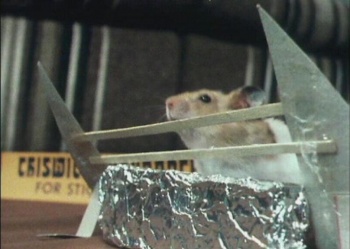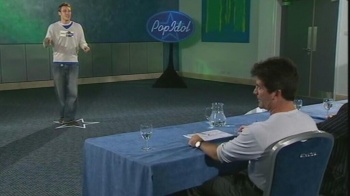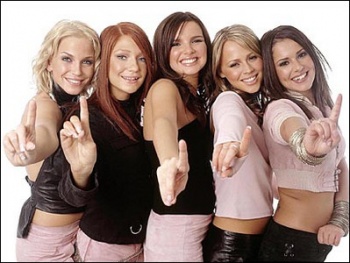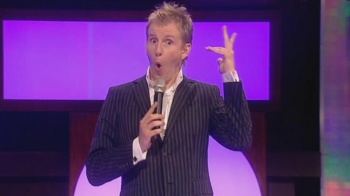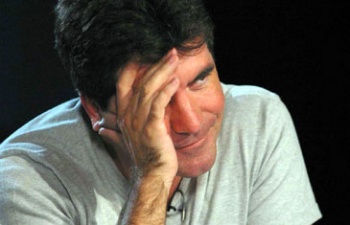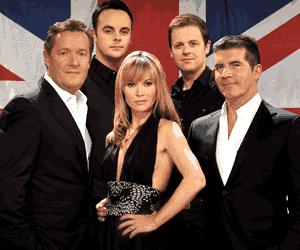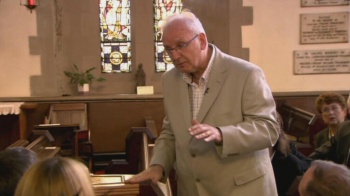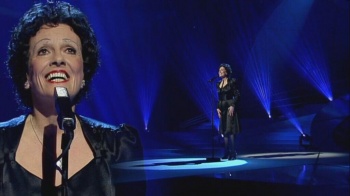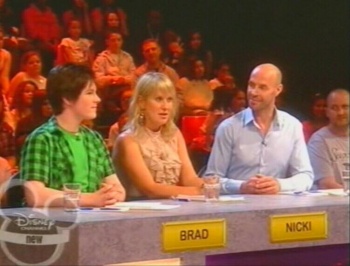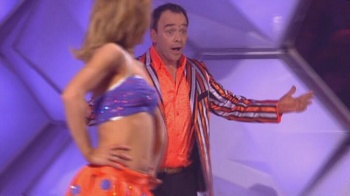Weaver's Week 2009-11-15
m (1 revision) |
UKGameshows (Talk | contribs) |
Revision as of 14:00, 22 December 2009
Last week | Weaver's Week Index | Next week
Contents |
Weaver's Decade IV: Singing for Survival
| Talent shows are not the most novel form of entertainment. Almost since the invention of entertainment, humanity has been challenging each other to find out who was the best singer, the best dancer, the best at banging rocks together and making fire. In the twentieth century, the democratisation of travel and the invention of mass media made it easier for contests to reach a wider audience. From the dance marathons of the 1930s (where the last couple on the floor won) to the radio show Opportunity Knocks and the televised New Faces, novel talent has always proven a ratings winner. The new century has proven just as propitious for shows that wanted to find talent, and to put viewers in front of the television. Part four of the Week's review of the decade explores this area.
It's hard to remember now, but there was a very short-lived revival of traditional variety shows in the year 2000. At one point in the early spring, three of the terrestrial television channels – BBC1, ITV, and Channel 5 – were all putting out showcases of unknown acts in primetime. It's as if the commissioners had collectively regressed to 1970, and no-one had told them that Life on Mars wasn't due for seven years. This old-fashioned approach was blown out of the water in the opening week of 2001, when Popstars (ITV, 2001-2) arrived on the scene. The basic idea of Popstars was simple: make a pop group on national television, and because the show will attract ten million viewers, they'll become stars overnight. At least, that was the theory according to Nigel Lythgoe. He'd seen the original Australian production, followed their band soar to stardom, and needed a television network and a record company to play ball. ITV came on board quickly, but Lythgoe shopped the idea around the record companies all summer before Universal and Simon Fuller said they'd work with the winners. | |
| Viewed in hindsight, the Popstars show had some unusual edges. There was no presenter, just a narrator's voice giving dry facts, clearly a nod to Marcus Bentley's role on Big Brother. Instead, the heat and light came from the show's three judges: Nicki Chapman, the former Spice Girls publicist; Paul Adam, an A&R man from Polydor; and Lythgoe himself. The genius lay in showing the British public at its worst – tuneless renditions of "Angels" and "Flying Without Wings", carefully edited together to make a whole song, and with appropriate shots of the panel rolling their eyes / with their head in their hands / praying for relief. Lythgoe told the contestants what the viewers at home were thinking: can't sing, can't sing, can't sing. Nigel was given clear latitude to be as nasty as he liked to the contestants. Was he channelling the spirit of Anne Robinson, whose blunt straight-talking had surprised the game show world the previous summer?
The fabulous five were named. Noel, Kym, Myleene, Danny, and Suzanne became Hear'Say, became the ITV house band, and became instant stars overnight. Around this point, Popstars morphed from a documentary exposing the manufacture of a band into a show about the television exposure gained by the band formed on television. "Pop will eat itself" proclaimed one band in the 1980s: here was an oroboros of television eating pop eating television eating pop... Hear'Say's first single was released a month after the group had been formed, and sold half a million copies in the first week. The series ended with the news that not only were they number one in the chart, they were the fastest-selling debut act ever in the history of ever, and they all lived happily ever afterwards. Well, no, they didn't. Hear'Say had been put together to fill a particular brief – young, look good, taught how to dance and how to handle the press, but the music came a long way down their priorities. The group sold more singles in their first seven days than they would in the rest of their career, one member left in early 2002, and the band imploded after just eighteen months. It didn't matter, because Britain had replaced its clapped-out old pop stars with shiny new pop idols. | |
| During summer 2001, Nigel Lythgoe moved from LWT to establish 19 TV, an offshoot of Simon Fuller's organisation. One of his first projects was Fuller's new show, Pop Idol (ITV, 2001-4). Fuller had spotted a method of taking the concept further, combining the build-a-band aspect of Popstars with the voting opportunities of Big Brother. Nicky Chapman reprised her role from Popstars, and Lythgoe remained firmly behind the camera. Taking his place were Simon Cowell and Pete Waterman, who would both give extreme amounts of grief to the performers they found less than adequate. Doctor "Neil" Fox completed the panel, for reasons not entirely unrelated to the fact that he hosted the chart show on independent radio.
Stylistic changes were evident from the start: rather than the anonymous voice-over of Popstars, host Antan Dec was waiting backstage to cheer on the auditionees, and congratulate / commiserate after they'd performed. That the viewers had a representative in the room made it far less intrusive to see dreams being shattered, one of the more awkward moments of Popstars. The performances were all solo efforts – none of the mass choir singing of "Angels", this was a million solo renditions of the same song. After about a month of this, 50 would-be idols remained. Over the space of five weeks, they performed a solo piece with piano for public approval. Rather than have the pop panel put their preferred singers through, the viewing public called up and did the job for them. Then a run of nine live shows from mid-December until the final in February saw one person's dream shattered each week. The stories captured the national imagination – the illness and forced elimination of Rik Waller, the amazingly difficult choice of Abba songs, the way it appeared the show was being built up to promote Gareth "The Anointed One" Gates, the bizarre decision to play big band standards and a version of "Mack the knife" that killed Gareth's ambitions dead. Pop Idol captured the national imagination, and made for outstanding television. | |
| Almost everyone involved won from the series. Will Young was the televote winner, Gareth "The Annoying One" Gates and Darius Danesh built careers from their involvement, and many of the final contestants continued on stage. Antan Dec had a successful Saturday night show after the failure of Slap Bang. Dr. Fox had built himself an image as slightly more substantial than a breath of air – the man who said "there's no scientific evidence for it, but it's a fact" was now credible. Slightly. Pete Waterman and Nicki Champan had advanced their careers, and Simon Cowell didn't do too badly, either. Pop Idol won the Rose d'Or, as "near perfect television" and "entertainment writ large", according to the panel that sat in judgement on the judges.
In fact, perhaps the only loser was Kate Thornton, clearly out of her depth while hosting the Pop Idol Extra show on ITV2. Three hours a day of it! Three hours a day of her! Digital channels have gone on to fill out their schedules with extra transmissions – Fame Academy on BBC Choice and CBBC, X Factor on ITV2, Strictly on BBC2, Dancing on Ice's spin-off eventually turning up on the main ITV channel. All of the shows were two minutes of actual content inflated to fill half-an-hour of screen time. The Popstars format came back in autumn 2002 with Popstars: The Rivals, in which Pete Waterman and Louis Walsh were invited to create their own groups, albeit with the line-ups dictated by a public vote. Geri Halliwell added her experience of being in a manufactured band, Davina McCall shouted at the contestants to stay on their marks, and the whole series could adequately be summarised by any one of the interchangeable live shows, featuring interchangeable performers. After the groups were set, the final winners would be determined by the record-buying public, who would purchase the singles of Walsh's group (Girls Aloud) or Waterman's group (er, erm, One True Voice) and whichever became the Christmas number one would win. Hopes that the contest would be won by The Cheeky Girls (rejected at the audition, but first to release their single) were dashed, and Girls Aloud went on to launch a glittering career with their repertoire of about three songs. | |
| By then, the British public had already moved on to the next thrill. Fame Academy (BBC1, 2002-3) was based on the Spanish format Operation Triunfo, which had successfully found someone to finish midtable in the Eurovision Song Contest. The British version took a dozen promising youngsters, hothoused them in north London, then made them perform for the nation each Friday night. Kevin Adams provided dance tutorial, Carrie Grant helped coach the singing, and Richard Park was a spare wheel as the notional headmaster. The first show was absolute bobbins, as everyone agreed afterwards, but the standard quickly rose to provide an hour's proper entertainment, all singing and dancing on the huge Shepperton stage. Proper event television.
Would we be so royally rewarded in the next series? Er, no. The series began with some sing-off competitions in the middle of a blisteringly-hot summer, and continued at two shows a week until mid-August. There was plenty of talent on display, but the programme had decided to become a cheap Pop Idol clone for the BBC. Even the scheduling was a carbon copy, two programmes on a Saturday, neatly scheduled around the singing show on ITV. Richard Park presented himself as the most obnoxious man on the planet, trying to be even nastier than Simon Cowell, but his recurring criticism of Alistair Griffin came off as jealous grousing from someone who didn't actually recognise talent when he saw it. The new series was shot in the entrance hall to the Academy building, ensuring there's no space to do anything more than a bounce up-and-down. Everyone was up for the vote every single week, reducing the learning curve to a linear popularity contest. Things got so desperate that Park got involved in a blazing stand-up row with host Patrick "Good work, fellah" Kielty, one that had real emotion, and we hoped would have no winner. There was a loser from the exchange, it entirely eclipsed the performance by Paris Campbell-Edwards, distracting casual voters, causing him to fall out of the contest that week, and allowing Griffin and Alex Parks passage to the final, won by Parks. | |
| It was no surprise that the 2003 run of Fame Academy was the last to seek new talent, though charity editions continued until 2007, and The One and Only (BBC1, 2008) was Fame Academy with celebrity impersonators. To greater surprise, the 2003 run of Pop Idol proved to be its last. The new series tried to repeat the success it had had eighteen months earlier, but proved only that lightning won't strike twice. Yes, it was hugely likeable and professional – certainly far more so than Fame Academy – but the narrative arc was far less pronounced, and there was more actual talent on the BBC programme. We still find it a surprise that the Pop Idol family ended on New Year's Day 2004 with the crowning of Kurt Nilsen as the World Idol.
In its place came The X Factor (ITV, 2004 – present), a radically different series created by Simon Cowell. It was all his own work, apart from the 20% that was credited to Pop Idol, and the elements from Popstars and Strictly Come Dancing. A panel of judges – initially Cowell, Louis Walsh, and Sharon Osbourne from hit fly-on-the-wall documentary series The Osbournes – would travel the country auditioning potential singers. Unlike Pop Idol, this show was open to all ages; like Pop Idol, it was only interested in singers. Once the pool of applicants had been reduced to manageable numbers, they were divided into groups and solo singers, and the soloists by age, and each of the judges given responsibility for one category. They'd pick four from the category, and the viewing public would then vote. The last two in the televote are in danger, and the judges will vote to save one of them; whichever loses that vote is out. Most weeks, two of the judges will have acts in the sing-off, allowing the third to vote out the one they thought worse, or the greater threat to their contestants. | |
| The X Factor's gimmick is that it's not just a competition between the performers, but also between the judges, who are all staking some personal and professional pride on the outcome. This is reflected in the calls to vote, where it's not the performer's picture shown on screen, but their sponsoring judge. It's reflected in the back-stabbing and bickering amongst the judging panel, most famously Osbourne throwing water over Walsh.
Over the years, The X Factor developed a predictable television grammar of its own – reaction shots thrown in without regard to continuity, successful auditionees always finding out on an upwards key change, as much inter-judge bickering as is possible. If there were a drinking game based on the cliches of the show, viewers would be suffering from alcohol poisoning. Almost inevitably, The X Factor was a promotional vehicle for Simon Cowell in particular, and for his Sony BMG group in general. Cowell's company Syco signs all the finalists, and the recordings are distributed through Sony BMG. The company also supplies most of the show's guests – Bon Jovi, Michael Bublé, the Black Eyed Peas – and a surprisingly large chunk of the repertoire performed on the programme is licensed by Sony BMG or its subsidiaries. | |
| Changes to the format saw lightweight host Kate Thornton replaced first by a sack of potatoes and then by Dermot O'Leary. Sharon Osbourne was replaced by Kylie Minogue's Sister and Cheryl Cole from Girls Aloud (that oroboros swallowing its own head), and the tactical DEADLOCK came into being, where the judges are split 2-2.
Indeed, in the week before this review was published, Cowell very cleverly refused to make a choice between two very different performers, allowing the public vote to rule. Why might he want to give up his casting vote? Cowell knows that his show is a money-making machine first, and that putting bums on seats is very important. Get people to talk about his show, people will watch it, ITV will rake in the money and want to renew the format at any price. Cowell will become even richer, and without forcing anyone to sing "'Unchained' Melody". Never mind the fact that reality shows have found approximately four genuine stars (Will Young from Pop Idle 2002, Lemar from Fame Academy 2002, Girls Aloud from Popstars The Rivals 2002, and Leona Lewis from The X Factor 2006), the main thing Cowell's selling is his format and his notoriety. Pop Idol, The X Factor, Fame Academy aren't pure singing competitions – if they were, the contenders would be dressed as choirboys and asked to go from do-a-deer to do and back again. No, they're an exercise in marketing and selling a vision to the masses, and Simon Cowell has proven an expert at that slicing and dicing. It might lack artistic merit (see the singing career of Robson and Jerome), but heavens it's popular. | |
| That might explain how Britain's Got Talent (ITV, 2007 – present) was commissioned. So might the fact that the old-fashioned variety show still has a place in people's hearts. Simon Fuller mused in 2002 about The Global Talent Show, airing simultaneously in all the major television markets of the world. Cowell's take on the travelling talent show put him back on the judging panel, with Amanda Holden and Piers Morgan acting as his supporting cast. Again, rounds of heats led to televised semi-finals and a grand final, usually won by a fit young dancer. It was Pop Idol without the pop.
There were more traditional performance competitions – BBC Young Musician and BBC Cardiff Singer of the World ran in alternate years through the decade. Nods to the higher arts could be found in Operatunity (C4, 2003), which sought a star of opera. Classical Star (BBC2, 2007) tried to find someone who could be marketed to a mass audience; given that the winner hasn't permeated the mass market, the show has to be seen as something of a failure. Maestro (BBC2, 2008) brought celebrities to the world of conducting with greater success. In the critical list, musical theatre falls somewhere between classical and popular music, and has proven a rich vein for well-adjusted shows. Ground was broken by How Do You Solve a Problem Like Maria? (BBC1, 2006), in which Andrew Lloyd Webber found a lead for his revival of The Sound of Music. This series followed many of the conventions established by The X Factor – audition shows, live shows, a panel of judges with license to speak their minds, viewer televoting, and Lloyd Webber deciding who should leave the show. A very similar format promoted Joseph (Any Dream Will Do, 2007) and Cameron Mackintosh's Oliver! (I'd Do Anything, 2008). ITV tried to muscle in on the territory with Grease is the Word (2007), but it was so clearly a copy of ...Maria that even Simon Cowell couldn't save the show. | |
| Just as Space Cadets had done for Big Brother, so the music shows were spoofed by Britain's Got The Pop Factor and Possibly a New Jesus Christ Soapstar Superstar Strictly on Ice (C4, 2008) Pete Waterman, Nicki Chapman, and Dr. Fox reprised their roles from Pop Idol, Fame Academy's Cat Deeley played the vacuous host (a role from The X Factor), there were more sob stories than on Britain's Got Talent, and the winner's song, "The Winners Song", was almost so over-the-top as to be the sort of thing Cowell would throw at his winners. Peter Kay's two-hour spectacular made that year's entire run of The X Factor redundant, and this year's head into equally silly territory.
Kay's programme referred to the other strand of performance shows we've seen this decade, where celebrities attempt to do something where they might end up making fools of themselves. There's always been a market for television personalities outside their field of expertise – remember Angela Rippon on the Morecambe and Wise show? – but in this decade, it's become even larger. Strictly Come Dancing (BBC1, 2004 – present) brought ballroom dancing to the masses. Strictly had the opportunity to write the rulebook, and took it with both hands. The auditions were entirely dispensable, but the judges' say was formalised, their ranking was combined with the ranking of the public vote to produce the final result. Then the bottom two would dance off again, with the judges determining who would leave. This last idea would be adopted by The X Factor when it took to the screen a few months later. | |
| Strictly is an entirely innocent show, promising nothing more than celebrities dancing in the traditional ballroom styles. That made for a clear contrast with the intrigue of The X Factor, which it's gone up against since its second series. There have been many spin-offs – Strictly Dance Fever (2005) and DanceX (2007) didn't really work, championship of championship competitions have proven very successful on Christmas night.
ITV had independently developed a similar show, and though Dancing on Ice (2006 – present) was three series behind Strictly, it's remained a regular ratings winner. Who would turn down the chance to see Andi Peters making a fool of himself by falling over? Even so, it feels like Strictly, but on ice, and lacks something of the warmth of Brucie's show. ITV's long-running impressions show Stars in Their Eyes was allowed to wither on the vine, losing the members of the public and replacing them with people off of Coronation Street, which wasn't quite as endearing. There were shows asking celebrities to do a funny turn – The All Star Talent Show (C5, 2006) was a pre-emptive spoiler against Britain's Got Talent, and The X Factor Battle of The Stars (ITV, 2006) was self-explanatory. ITV's soap operas used talent shows as a two-way street – Soapstars (ITV, 2001) found a short-lived set of characters via an audition process that copied Popstars. On the other hand, Soapstar Superstar (ITV, 2005-7) took the cast of soaps, and got them to sing a la Pop Idol. The show is only remembered as one of the most egregious failures of ITV's premium rate telephone systems. The only failures were ones of "why did you commission this?" for Sing It Back: Lyric Champion 2007 (2007), a quiz about knowledge of song lyrics, and for competitive karaoke show Who Dares Sings! (2008-9). |
|
| Even politics wasn't immune from the idea, though Vote for Me (ITV, 2005) quickly degenerated into farce, with the series coming down to a straight choice between someone obsessed by mobile phones, and someone even further to the right than the right margin. The website rowed back from the winner as the series progressed, and judge Kelvin MacKenzie has quietly and conveniently forgotten about the show.
Children's shows tended to ignore the phone vote, though Starfinder (ITV, 2004-6) was a worthy attempt to find the most capable young astronaut. BBC shows like The Slammer (2006-8) and Skate Nation (2009) preferred to keep the voting in the studio, which was no bad thing. Equally self-contained was Hannah-Oke (Disney Channel, 2009), a show inviting all the family to sing and dance and have a fun time. For all their claims of helping to nurture young talent, shows actually giving a leg up to talented youngsters on their own terms have been few and far between. Simon Cowell wants to mould everyone into a commercial package he can sell, Britain's Got Talent is only interested in people who can demonstrate their talent in three minutes, and the rest of ITV's schedule is only interested in established celebrities, assuming that someone else will give new talent a break. We were gratified to follow the E4 School of Performing Arts (E4, 2007), and see young singer-songwriters, young dancers, young actors get a chance to hone their talents and win places at respected schools. A similar prize was on offer for sportspeople in Born to Win (BBC1, 2003). But the under-investment in young talent continues; television picks off the cream of other people's work. | |
| Simon Fuller's dream of a global talent show has never come off, but international contests have been running for a very long time. The Eurovision Song Contest (1956 – present) reached new levels of popularity this decade, as Eastern Europe sent its biggest and best talent, and was rewarded with a string of victories. Across the continent, people could gawp at the foot-stomping Ukranians, laugh along with the Finns, wow at the Norwegian... and hide behind the sofa during the British entry, for the UK remained resolutely behind the fashion. At least, the UK used to be behind the times; a new domestic commentator for 2009 was the excuse the BBC needed to use a proven talent, and Andrew Lloyd Webber guided the country to a top-five finish.
The Eurovision Song Contest begat a Junior version (2003 – present), shown on ITV and ITV2 until 2005, when the company found the whole thing to be a bit of a waste of time. Eurovision Young Musicians continued every second year, with the continent uniting to see promising talent play live. Eurovision Young Dancers went out in the odd-numbered years, again playing to packed audiences across the continent. That's except in the UK, where the shows were shoved out on arts ghetto BBC4, sometimes three months after the event. Young Dancers was cancelled after 2005, in favour of the Eurovision Dance Contest (2007-8), a cross between Strictly and the Song Contest that never quite found its reason to be. Throughout the decade, there's been a sense that the Great British Public might wish to pull one over the judges. Rik Waller may only have made the final ten on Pop Idol because of his ineptitude, and was Will Young's victory a reaction to Simon Cowell's overt preference for The Anointed One? Todd Carty and John Sergeant were kept in their dancing shows long beyond their actual talent, and we wonder if Steve Brookstein's victory in X Factor 2004 was Britain asking Mr. Cowell to make a silk purse out of that sow's ear. The greatest such example, surely, is the success of the Grimes twins on the 2009 series of X Factor; can't sing, can't dance, but such showmen as to divide the country. Britain has a challenge for Simon Cowell: John and Edward are talented, they don't fit his mould, can he work with them? Does Simon have the X factor? |
The next part of the Week's review of the decade looks at the other shows we've loved, and that don't fit into any of the main themes we've discussed. "Well done, young warrior" follows in a fortnight.
University Challenge
Second round, match 2: Newnham Cambridge v St Andrews
Well, it had to happen. Two of the teams that really impressed us in the opening round clash in the second phase. Newnham soared past Sussex on the August bank holiday, St Andrews accounted for a very promising Somerville Oxford side on 5 October. First blood goes to Newnham, getting place of the week, "Alexandria". St Andrews get the next two starters, and we note that their mascot is wearing the university's famed scarlet cloak.
Unprecedented scenes at supper-time! Thumper actually apologises for shouting at the Newnham side, telling them not to confer. Apologising for enforcing the rules, this never happens! A set of bonuses on feminist theory goes to the all-male St Andrews team, we suspect that the all-female Newnham side might have done slightly better. The lads get a perfect four on the first visual round, it's about fighter planes of World War II. Not a stereotypical blokey subject, oh no. St Andrews has taken a lead, 60-40.
So, Newnham gets a starter on the poetry of Wordsworth, and their reward: questions on African club football sides. Why is it we like Newnham? They're a team in colour: St Andrews have dressed in greys with an accent of white, only their mascot has proper colour. Newnham are dressed in red, green, white, and black, and are not in danger of disappearing into the set. St Andrews completely fail when asked about Mrs. Tiggywinkle, no-one remembers who wrote the Can-Can music (it was Offenbach), and St Andrews leads by 95-70.
That's the first in a run of five dropped starters, questions that neither team can get right. The audio bonuses are eventually taken, they're on French Romantic composers. Geekery of the Weekery is on the LAMP server, no-one can tell what it stands for. Hidden transmission indicator of the week is on the construction of the Berlin Wall in August 1961; we're missing the toppling of the dominoes along its path to commemorate its fall twenty years ago tonight. The second visual round is on cubist art, and St Andrews had extended its lead slightly, 110-80.
It's all to play for in the final round. The round of questions on the Ig Nobel prizes are fascinating, but ultimately pointless. Does FTP count as a geekery? Probably not, it's been a current technology since at least one of the teams was still to be born. Thumper's hurrying the St Andrews side along with their bonuses, but not the Cambridge side, who are given more internet country codes to decode. St Andrews arrive in Tir-na-Nog with a couple of minutes to play, are perfect on Machiavelli, and that's feeling like game over. More starters are dropped, the remainder go to St Andrews, and at the gong, St Andrews has won by 185-110.
Did St Andrews get a bit lucky? Their bonus conversion rate was abysmal, just 13/37 with two missignals. Christopher Flaherty was the difference, picking up nine starters during the programme. Newnham perhaps didn't have the questions this time, but Lizzy Cole and Leonie Pett both got three starters. The side was right on 10/21 bonuses with two missignals. With twelve starters evading both sides, the overall conversion rate was just 43/90.
Next match: St John's Oxford v Loughborough
Mastermind
Heat 11
Barbara Thompson's is not a name to be taken lightly – she was crowned Brain of Britain in 1989, and won Fifteen-to-One in 1992. Tonight, she takes British female cabinet ministers, the people who are in attendance at meetings of the Cabinet with day-to-day responsibility for the running of some aspect of government. Margaret Bondsfield was the first, Minister of Employment in 1929; there are four such people at the moment. The round takes us through such honest politicians as Estelle Morris, who resigned because she wasn't up to the job. 14 (2) is certainly up to the job.
We're worried now, Michael Burton is offering "Angels". Ear-defenders on.... oh, these are the religious figures, and not the Guy Chambers song massacred by a million Popstars contestants. The questions jump all around the place, from history to theology via literature and mystics. We'll channel the judges from Hannahoke and not criticise, because it's really difficult to appear on this show at any time, and that was a bizarre set of questions even by this show's variable standard. 2 (7).
Mike Gradone will tell us about the Stone of Destiny. Also known as the Stone of Scone, it's said to have been used as a pillow by Jacob while dreaming of angels climbing a ladder, presumably to suggest that people slept on bags of feathers and not hard rocks. The stone eventually turned up in Scotland, where kings were crowned on it until it was looted by Edward I and removed to London. It was returned to Scotland in 1996. The questions tend to be about the last 150 years, or the movement of the stone in the thirteenth century. It's a good score, 13 (1).
John Higgins (no, not the snooker player) is discussing The Birdcage books of Victor Canning. This author (1911-86) wrote thrillers in the immediate aftermath of the war, with faraway settings and pacy action sequences. "Birdcage" is a member of the British government's dirty tricks department, cleaning up after ministers' mistakes, and featuring in eight of Canning's novels. The contender spends a fair chunk of time discussing his answers, none of the in-and-out from other people. Not that it hurts him too badly, he finishes on 12 (3).
We're thoroughly impressed that Mr. Burton asks, "Did I have any passes" as he strolls up to the chair. We can only sympathise that he remembers the third judge on Britain's Got Talent, Piers Morgan; and the obscure 1980s political grouping the Esdipi. The final score: 7 (15).
The repechage:
- John Cooper 29 (3)
- Ian Scott Massie 26 (2)
- Les Morrell 26 (3)
- Colin Wilson 25 (0)
- William de Ath 25 (4)
- Frances Gregory 24 (2)
Mr. Higgins is striding up to the chair with great purpose, and remembers why Vinland got its name; we're also impressed that he declines to remember Paul McCartney's obscure flick Give My Regards To Broad Street. 19 (8) is the final score.
Mike Gradone is next, and he begins with the question: who is the current Mayor of London. Cripes, gosh, you know, that cad from Have I Got News for You, golly. After that, correct answers are a little more difficult to find, and the final score is 17 (9).
Barbara Thompson needs just six to win the show tonight, and we know she's scored that in the past. Dressage takes her over the finishing line, Phantom of the Opera confirms her win, and even though a guess at one of the Seven Wonders is wrong, it's always good to try, as she finds on her final question. 26 (3) will see her through to the next round.
This Week And Next
In the week to 1 November, Simon Cowell Annoys set more records, 14.5m saw the results, 11.75m the performances. Strictly had a series-best 9.15m, Family Fortunes 6.75m, and HIGNFY a round 5m. University Challenge remains popular, 3.25m saw the match, with 2.75m for Dancing on Two, 2.7m the extended HIGNFY, and 2.4m for Mastermind puts it exactly level with Deal or No Deal, and ahead of The Restaurant (2.15m, plus 50,000 on BBC-HD).
Cowell continues to set the pace on ITV2, 1.75m on Sunday night, 715,000 the midnight repeat on Saturday night. 1.12m for Come Dine With Me, 400,000 for Mock the Week and QI XL on Dave, and 335,000 for the return of Argumental – it's now heading to BBC2.
Next week's Week is scheduled to review Raven and Keep Your Enemies Close. Before then, there's plenty on the television. I'm a Celebrity... Get Me Out of Here! is back (ITV, from 9pm Sunday). On Countdown (C4, 3.25 Monday), friend of UKGameshows Ryan Vickers will be appearing in the challenger's seat. Top comedy as I'm Sorry I Haven't a Clue returns (Radio 4, 6.30 Monday), and Young Butcher of the Year (BBC3, 9pm Tuesday) will carve up all opposition. Raven reaches the end of the series (BBC1, 4.05 Thursday), Deal or No Deal comes to Ireland (TV3, 8pm Friday), and not only is there a regular edition of Mastermind on Friday, there's also a comedy edition supporting the annual Children in Need of Assistance appeal (BBC2, 10pm Friday). Next Saturday's times: Strictly 6.50 – 8.20, with Shirley Bassey performing; Simon Cowell 8pm – 9.20, immediately followed by I'm a Celeb.
To have Weaver's Week emailed to you on publication day, receive our exclusive TV roundup of the game shows in the week ahead, and chat to other ukgameshows.com readers, sign up to our Yahoo! Group.

